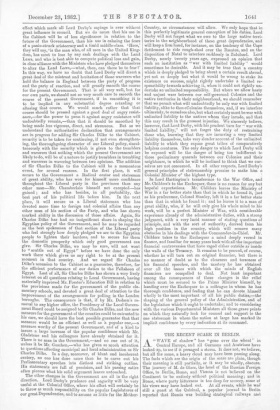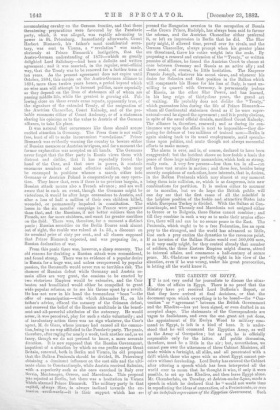THE RECENT SCARE IN BERLIN.
A"WAVE of shadow" has "gone over the wheat" in Central Europe, and all Germans and Austrians have looked up, to see if it presaged a storm. It does not, we believe, but all the same, a heavy cloud may have been passing along. The facts which are the origin of the scare are plain, though their meaning is still partially, or it may be wholly, obscure. The journey of M. de Giers, the head of the Russian Foreign Office, to Berlin, Rome, and Vienna is not believed on the Continent to be entirely without political meaning ; and in Rome, where party bitterness is too deep for secrecy, some of his views may have leaked out. At all events, while he wai still a guest at the Quirinal, a popular journal in Berlin reported that Russia was building strategical railways and accumulating cavalry on the German frontier, and that these threatening preparations were favoured by the Panslavie party, which, it was alleged, was rapidly advancing to power in St. Petersburg. Immediately afterwards, Count Herbert Bism- arck, his father's most confidential secre- tary, was sent to Vienna, a 0 revelation " was made, obviously at Prince Bismarck's instigation, that the Austro-German understanding of 1879—which so greatly delighted Lord Salisbury—had been a definite and written agreement ; and it was asserted, in the regular, semi-official way, that the Treaty was to be renewed for a further term of ten years. As the present agreement does not expire until October, 1884, this carries on the Austro-German alliance to 1894, more than twelve years hence, a period beyond which no wise man will attempt to forecast politics, more especially as they depend on the lives of statesmen all of whom are passing middle life, while the greatest is growing old. Fol- lowing close on these events came reports, apparently true, of the signature of the extended Treaty, of the resignation of the Austrian Chancellor, Count Kalnoky, and of the pro- bable summons either of Count Andrassy, or of a statesman sharing his opinions as to the value to Austria of the German alliance, to take 113 place.
It was natural that occurrences like these should arouse excited attention in Germany. The Press there is not really free, least of all to make inconvenient "revelations," Prince Bismarck was evidently warning the country to beware either of Russian menaces or Austrian intrigues, and for a moment the former explanation was accepted on all hands. The Germans never forget that the Slav party in Russia views them with distrust and dislike, that it has repeatedly forced the hand of the Czar, and that once in power, it controls enormous numbers of most effective soldiers, who may be encamped in positions whence a march either into Germany or Austrian Poland is comparatively an easy opera- tion. They know that, even if there is no previous bargain, a Russian attack means also a French advance ; and are well aware that in such an event, though the Germans might be victorious, it would be after large concessions to Austria, and after a loss of half a million of their own children killed, wounded, or permanently impaired in constitution. The losses in the six months' campaign in France were greater than that, and the Russians, if not better soldiers than the French, are far more stubborn, and exact far greater sacrifices on the field. There was, therefore, for a moment a distinct panic ; Russian securities on the Berlin Bourse sank almost out of sight, the rouble was valued at 18. 3d., a discount on its nominal price of sixty per cent., and all classes supposed that Prince Bismarck expected, and was preparing for, a Russian declaration of war.
• From this panic there was, however, a sharp recovery. The old reasons for doubting a Russian attack were reconsidered, and found strong. There was no evidence of a popular desire in Russia for a huge war, and unless overpowered by popular passion, the Romanoffs would never run so terrible a risk. The chances of Russian defeat while Germany and Austria re- main allies are very great, the cessions to be exacted by two victorious Empires would be extensive, and the Czar beaten and humiliated would either be compelled to grant wide popular reforms, or to see his throne upset by a revolt. He has not now in his hand the tremendous "boon "—the offer of emancipation—with which Alexander II., on his father's advice, effaced the memory of the Crimean defeat, and renewed the belief of the Russian multitude in the benefi- cent and all-powerful attributes of the autocracy. He would never, it was perceived, play for such a stake voluntarily ; and of involuntary action there was no sign whatever, the Czar's agent, M. de Giers, whose journey had caused all the commo- tion, being in no way affiliated to the Panslavic party. The panic, therefore, after raging for nearly a week, took another and, as we fancy, though we do not pretend to know, a more accurate direction. It is now supposed that the Russian Government, impatient of a situation by which no one profits except Great Britain, renewed, both in Berlin and Vienna, its old proposal that the Balkan Peninsula should be divided, St. Petersburg obtaining a dominant influence on the east side and the ulti, mate claim to Constantinople, while Austria received Salonica, with a superiority such as she once exercised in Italy over Servia, Montenegro, Greece, and Macedonia. This proposal was rejected at Berlin, but there was a hesitation in Vienna which alarmed Prince Bismarck. The military party in that capital, .always Slav, is always inclined towards the ex, teasion southwards—it is their support which has re4 pressed the Hungarian aversion to the occupation of Bosnia —the Crown Prince, Rudolph, has always been said to favour the scheme, and the Austrian Chancellor either preferred it, or left an impression in Berlin that he did. The Slav party might, if allowed time, prevail over its rivals, and the German Chancellor, always prompt when his greater plans are threatened, threw his entire weight into the scale. By proposing a renewal and extension of the "Treaty," or written promise of alliance, he forced the Austrian Court to choose at once between Germany and Russia as an active ally ; and there could, of course, be little hesitation. The Emperor Francis Joseph, whatever his secret views, and whatever his desire for Salonica and that position in the Balkan which will compensate his House for his loss of Italy, is most un- willing to quarrel with Germany, is permanently jealous of Russia, as the other Slav Power, and has learned, in his long reign of thirty-four years, the grand art of waiting. He probably does not dislike the "Treaty," which guarantees him during the life of Prince Bismarck— whom all Continental statesmen dread as if he were super- natural—and he signed the agreement ; and it is pretty obvious, in spite of the usual official denials, sacrificed Count Kalnoky. The alliance is, therefore, renewed ; and as during its con- tinuance war upon the allies is next to impossible—they dis- posing for defence of two millions of trained men—Berlin is again sinking back to its usual employments, acrid specula- tions upon politics, and acute though not always successful efforts to make money.
The alarm is over, and is, of course, declared to have been exaggerated; but the incident shows on how feeble a basis the peace of these huge military monarchies, which look so strong, really rests. A very few persons—less than ten in all—can set these vast armies in motion ; and these few, besides being secretly suspicious of each other, have interests, that is, desires, in the Balkan Peninsula which may almost at any moment bring them into collision, or, which is as dangerous, into new combinations for partition. It is useless either, to murmur or to moralise, but we do hope the British public will one day see that the first cause of all the mischief is the helpless position of the feeble and attractive States into which European Turkey is divided. With the Sultan at Con- stantinople, and Thessaly and Macedonia not assigned either to Greece or to Bulgaria, those States cannot combine ; and till they combine in such a way as to make their armies effec- tive, there will and can be no secure peace in the East. The Peninsula, which ought to be a free Federation, lies an open prey to the strongest, and the world has advanced so little, that such a prey excites the dynasties to the ravenous point. If an invasion of the Balkan States would cost 500,000 men, as it very easily might, for they control already that number of soldiers, the three Eastern Empires might disarm, attend to internal affairs, and commence a half-century of secure peace. Mr. Gladstone was perfectly right in his view of the situation, even if he was wrong, under his great provocation, in letting all the world know it.


































 Previous page
Previous page